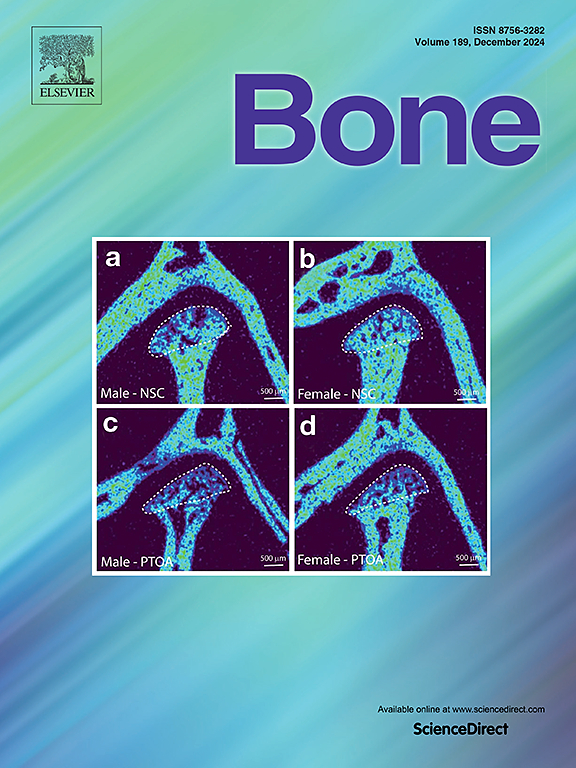益生菌在骨质疏松症中调节RANKL的作用:动物介入研究和随机对照试验的系统综述。
IF 3.6
2区 医学
Q2 ENDOCRINOLOGY & METABOLISM
引用次数: 0
摘要
背景:骨质疏松症是一个主要的全球健康问题,其特征是骨量减少和结构恶化。RANK/RANKL/OPG信号通路在骨重塑,特别是破骨细胞发生中起关键作用。新出现的证据表明,益生菌可能通过肠-骨轴调节这一途径,为骨质流失提供潜在的治疗益处。目的:本系统综述旨在评价补充益生菌对核因子κ κ受体激活因子-Β配体(RANKL)在动物和人骨质疏松相关介入研究中的影响。方法:对截至2025年6月的PubMed、Scopus和谷歌Scholar数据库进行综合文献检索。英文发表的原始介入研究,包括动物和人类模型,根据预先确定的纳入和排除标准进行选择。评选过程遵循PRISMA的指导方针。由独立评审员评估研究的质量,并提取相关数据进行综合。结果:共有24项研究符合纳入标准,其中大多数采用去卵巢啮齿动物模型和两项绝经后妇女随机对照试验。几种益生菌菌株——尤其是植物乳杆菌、罗伊氏乳杆菌、干酪乳杆菌和长双歧杆菌——在动物模型中显著降低了RANKL的表达,而在人体试验中,尽管其他骨转化标志物有所改善,但对RANKL的影响有限或没有影响。结论:益生菌干预似乎通过调节RANKL对骨代谢产生有益影响,特别是在雌激素缺乏引起的骨质疏松症模型中。然而,人体试验的结果仍然有限且不一致。需要进一步的高质量随机对照试验来证实这些效果,并确定最佳菌株、剂量和治疗时间。本文章由计算机程序翻译,如有差异,请以英文原文为准。
The role of probiotics in modulating RANKL in osteoporosis: A systematic review of animal interventional studies and RCTs
Background
Osteoporosis is a major global health concern characterized by reduced bone mass and structural deterioration. The RANK/RANKL/OPG signaling pathway plays a pivotal role in bone remodeling, particularly in osteoclastogenesis. Emerging evidence suggests that probiotics may modulate this pathway through the gut–bone axis, offering potential therapeutic benefits for bone loss.
Objective
This systematic review aims to evaluate the effects of probiotic supplementation on Receptor activator of nuclear factor kappa-Β ligand (RANKL) in animal and human interventional studies related to osteoporotic conditions.
Methods
A comprehensive literature search was conducted in PubMed, Scopus, and Google Scholar databases up to June 2025. Original interventional studies published in English, including both animal and human models, were selected according to predefined inclusion and exclusion criteria. The selection process followed PRISMA guidelines. Studies were assessed for quality by independent reviewers, and relevant data were extracted for synthesis.
Results
A total of 24 studies met the inclusion criteria, most using ovariectomized rodent models and two randomized controlled trials in postmenopausal women. Several probiotic strains—particularly Lactobacillus plantarum, Lactobacillus reuteri, Lactobacillus casei, and Bifidobacterium longum—significantly reduced RANKL expression in animal models, whereas human trials yielded limited or no effect on RANKL despite improvements in other bone turnover markers.
Conclusion
Probiotic interventions appear to exert beneficial effects on bone metabolism by modulating RANKL, particularly in estrogen-deficiency-induced osteoporosis models. However, findings from human trials remain limited and inconsistent. Further high-quality RCTs are warranted to confirm these effects and determine optimal strains, dosages, and treatment durations.
求助全文
通过发布文献求助,成功后即可免费获取论文全文。
去求助
来源期刊

Bone
医学-内分泌学与代谢
CiteScore
8.90
自引率
4.90%
发文量
264
审稿时长
30 days
期刊介绍:
BONE is an interdisciplinary forum for the rapid publication of original articles and reviews on basic, translational, and clinical aspects of bone and mineral metabolism. The Journal also encourages submissions related to interactions of bone with other organ systems, including cartilage, endocrine, muscle, fat, neural, vascular, gastrointestinal, hematopoietic, and immune systems. Particular attention is placed on the application of experimental studies to clinical practice.
 求助内容:
求助内容: 应助结果提醒方式:
应助结果提醒方式:


